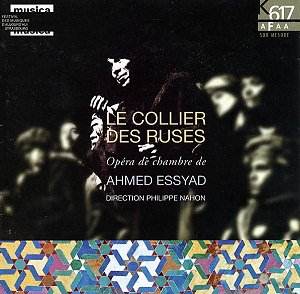|
|
Search MusicWeb Here |
|
 |
||
|
Founder:
Len Mullenger (1942-2025) Editor
in Chief:John Quinn
|
|
|
Search MusicWeb Here |
|
 |
||
|
Founder:
Len Mullenger (1942-2025) Editor
in Chief:John Quinn
|
 |
Ahmed ESSYAD (b1939)
Le Collier des Ruses, Chamber Opera Driss Roukhe, le poete Sonia Mekkiou Houcine Djiti Mohammed El Ouarandi Jean Lorrain Cecile Bonnet and Fabienne Gonzalez, sopranos Veronique Reibold, mezzo Instrumental Ensemble Philippe Nahon Recorded Strasbourg, September 1994 |
| CD available for post-free online mail-order or you may download individual tracks. For some labels you can download the entire CD with a single click and make HUGE savings. The price you see is the price you pay! The full booklet notes are available on-line. | |
|
NOTE • Click on the button and you can buy the disc or read the booklet details • You can also access each track which you may then sample or down load. • Further Information. |
|
|
Ahmed Essyad was born near Rabat in 1939. A pupil of Max Deutsch, himself a Schoenberg student, Essyad became aware of current influences in Western music whilst remaining loyal to the music of his own Arabo-Berber origins. In the extensive notes he is said not to make a synthesis between the two cultures but an "overriding enrichment of their specific qualities." Composed in 1977 the chamber opera The Necklace of Guiles was newly produced in 1994 for a Strasbourg production and these discs are one of the results. The work is part opera, part theatre and fuses twelve tone procedures with Arabo-Berber declamation, a piece of music theatre in a sense that explores, exploits and attempts to reconcile – in their perhaps irreconcilable tensions – the twin traditions to which the composer is heir. The synthesis between the Orient and the occident – a creative clash, an abrasion – takes as its text the words of the Arab poet of the tenth century B.C, El Hamadhani. If this implies a cultural cross-pollination the work is somewhat more resistant than that. It is rather, as the notes suggest, a Sufi mode of thought allied to Schoenberg’s musical principles. The work is a four act chamber opera interspersed with instrumental interludes between acts and lasts an hour and a half. Each act elucidates a Maqama – stories of treachery, debauchery, drunkenness, of tricksters, fables of the illusory delights of money and so on. The first Maqama opens with a sinuous oboe emerging from the small instrumental ensemble – two violins, two violas, cello, flute, oboe, piano, and percussion. Cello glissandos follow the oboe, then a solo piano with increasingly agitated clusters and trills. Arabo-Berber chanting follows with a melismatic chorus and a recitation of The Fable of the Wine. It is declamatory, often sombre, with a single keening string line, a cello, behind. This is rather difficult music to describe, even harder to evoke but in its play of self-conscious drama it has some kind of kinship with the intent – if not of course the musical intent – of, say, Maxwell Davies’ music theatre. At 17.05 there is some spectacularly ardent declamation and some et seq hysteria and clattering percussion. And this is very much the profile of the opera and one I found hard going. If a synthesis tends to dilute then a tension is oppositional and this is, I’m afraid, my response to the music. The techniques involved seem to me mutually incompatible – the Schoenbergian inheritance too abstract to bear the weight of the declamatory Arabic texts and those texts irreconcilable with the relative sophistication of the ensemble’s contribution. The internal fissure is fatally compromising to the fabric of the work. Production values are high, notes are thought provoking and the performers seem electrically alive to every musical impulse. Jonathan Woolf
|
| ADDITIONAL INFORMATION •
You can sample only 30 seconds (or 15% if that is longer) of a given track. Select from the View tracks list. Each sample will normally start from the beginning but you can drag the slider to any position before pressing play. • PLEASE NOTE: If you are behind a firewall and the sound is prematurely terminated you may need to register Ludwig as a trusted source with your firewall software.
•You will need Quicktime to hear sound samples. Get a free Quicktime download here • If you cannot see the "Sample All Tracks" button you need to download Flash from here.
|
|
|
Return to Index |